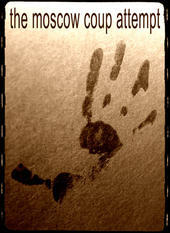
If you’ve tuned up or down a shortwave radio spectrum for any length of time you may have heard mechanical female voices droning a series of numbers into the ether … or crisp high-toned notes chiming a folk tune several times in succession. These transmissions are mysterious signals thought to be messages broadcasts to spies and agents all over the world. They are referred to as “spy number stations” and appear and disappear regularly on both varied and fixed frequencies. For more information please investigate http://en.wikipedia.org/wiki/Numbers_station.
Derek Whitacre is the architect of The Moscow Coup Attempt and the delightfully cryptic new cd The Failure of Shortwave Radio which incorporates and weaves samples of shortwave numbers stations throughout blissful washes of melody. The title is somewhat poignant for me as a shortwave radio listener who has witnessed the landslide of shortwave stations discontinuing their broadcasts to North America over the past five years including the BBC, and RVI from Flanders.
Graciously, Derek Whitacre sent me a promotional copy of The Failure of Shortwave Radio and agreed to an interview for this blog:
DJ Frederick: How did you discover shortwave radio in general and number stations in specific?
Derek: National Public Radio. I heard a story about Numbers Stations and a CD collection of Numbers Stations called The Conet Project. From that point I was hooked.
After weeks of research into the subject, I went searching for myself. Using online shortwave radio networks, I was finding numbers stations every once in a while. It's quite a tricky feat, but if you have the right information on their occurrences, you can find them. Anyway... some of my recordings actually made it onto the album. Others I got from sources world 'round, with permission of course. I'd also like to state for the fact, that NONE of my recordings came from The Conet Project collection. I say this because the individual that compiled it is quite letigious on record.
DJ Frederick: What are you thoughts on the state of radio in the US?
Derek: Short answer, it's dead. Long answer... The corporations that own most of the stations in the US could give a shit about music. It's all about bottom line. And to them, America is the same no matter where you go. We're all a faceless horde of consumers, who will take whatever we're given. So now they have the SAME STATIONS in different cities with the SAME PLAYLISTS. "Keep them listening so we can sell more add time... Oh, this playlist works in LA, so it must work in Denver, and Atlanta, and Boston." And where do those playlists come from??? Dying major labels that don't want to invest in anything but a limited scope of "artists" because to be different is bad. Do what works until it doesn't work. Then do it again with a new hot young piece of ass and call it new. Ok, ok... yes, there are a handful of "indie" stations (most of which are owned by these same corporations) playing different blends of music. But they are few and far between.However, I don't really care all that much because I really don't do what I do to get played on KROQ or STAR or Teenie-Bopper-of-the-moment-.7 FM. If I could get on KCRW or other low budget indie eclectic shows, that would be cool. What was the question again?
DJ Frederick: What is a Moscow Coup Attempt live concert experience like?
Derek: I give everyone a gram of dried mushrooms at the door and we just stare at a bug-zapper set up in the middle of the room. Yeah, actually it's kind of like going to see a really loud art film. I play with laptop and synth and other toys to a film montage I cut to the music. It's all archival footage, really creepy images, some not, ancient war footage, NASA development shite...There's a trailer for it on the "Moscow" website. Eventually I'd like to get rid of most of the computer oriented pieces and replace them with real honest to monkeys people playing instruments that don't require wall sockets.
DJ Frederick: I’m wondering if you could talk about some of your film / visual projects?
Derek: Well, other than what I just described, I've written scores for a couple short films no one will see. Actually, one of them is a good little film about fathers and sons called "Ringside Hero," directed by John Covarrubias. There have been some video games I've written stupid little LimbBuzzcut style songs for. I'm also into photography... a lot of macro-lens laden images like the photos I did for the "Failure" album art. RIGHT NOW... I'm thinking about the next film I want to do for "the Coup." Where as I wrote this album thinking about cinema and it being music for "a movie that never was," I might go the other direction and write and film and music together. More of a narrative structure than abstract expressionism.
* * *
One listen to The Moscow Coup Attempt folds the listener into a world of “eyelid movies” and beyond. For sound samples, video and more information cruise over to www.moscowcoupattempt.com.
The Failure of Shortwave Radio is available to purchase from cd baby via www.cdbaby.com/cd/tmca
Derek's cd was released on Capitalist Records (somehow being a non-capitalist I love that name!) which has a website forthcoming at www.capitalistrecords.com. The image on the temporary page made me smile.